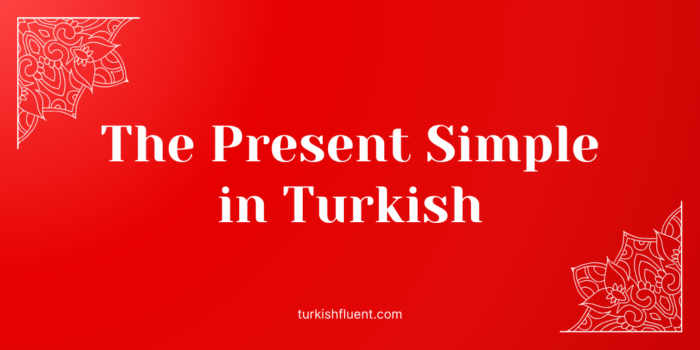The present simple tense, known as “geniş zaman” or “aorist” in Turkish, is used to express habitual actions, general truths, and routines. It is the equivalent of the English simple present tense, used in sentences like “I go to work every day” (“Her gün işe giderim.”).
However, keep in mind that the present continuous tense is much more commonly used in spoken language. We rarely use the present simple tense in conversation.
We can express the present simple tense in four ways: positive, negative, positive question and negative question. We will detail each one of them in this article. Iyi okumalar!
Table of Contents
1. How to Form the Present Simple Tense in Turkish
The formation of the present simple tense depends on the verb root and the ending of the verb. Below, we break down the main cases:
1.1 Verbs Ending in a Vowel (“-r”)
If the verb root ends in a vowel, attach “-r” followed by the appropriate personal suffix.
Examples:
- başlamak (to begin) → başla- → başlarım (I begin)
- yemek (to eat) → ye- → yerim (I eat)
- Sen her hafta kitap okursun. (You read a book every week.)
Conjugation Table:
| Personal Pronoun | Last Vowel a/ı | Last Vowel e/i | Last Vowel o/u | Last Vowel ö/ü |
|---|---|---|---|---|
| Ben | -rım | -rim | -rum | -rüm |
| Sen | -rsın | -rsin | -rsun | -rsün |
| O | -r | -r | -r | -r |
| Biz | -rız | -riz | -ruz | -rüz |
| Siz | -rsınız | -rsiniz | -rsunuz | -rsünüz |
| Onlar | -rlar | -rler | -rlar | -rler |
1.2 Verbs Ending in a Consonant with One Syllable (“-ar/-er”)
For verbs with a single syllable that end in a consonant, attach “-ar” or “-er” based on the last vowel of the verb root (see vowel harmony), followed by the personal suffix.
Examples:
- yazmak (to write) → yazarım (I write)
- çizmek (to draw) → çizerim (I draw)
- Ben her sabah sorular sorarım. (I ask questions every morning.)
Conjugation Table:
| Personal Pronoun | Last Vowel a/ı/o/u | Last Vowel e/i/ö/ü |
|---|---|---|
| Ben | -arım | -erim |
| Sen | -arsın | -ersin |
| O | -ar | -er |
| Biz | -arız | -eriz |
| Siz | -arsınız | -ersiniz |
| Onlar | -arlar | -erler |
1.3 Verbs Ending in a Consonant with More Than One Syllable (“-ır/-ir/-ur/-ür”)
For longer verbs that end in a consonant, attach one of “-ır/-ir/-ur/-ür” based on the last vowel, followed by the personal suffix.
Examples:
- kullanmak (to use) → kullanırım (I use)
- düşünmek (to think) → düşünürüm (I think)
- Ben her gün yeni bir şey öğrenirim. (I learn something new every day.)
Conjugation Table:
| Personal Pronoun | Last Vowel a/ı | Last Vowel e/i | Last Vowel o/u | Last Vowel ö/ü |
|---|---|---|---|---|
| Ben | -ırım | -irim | -urum | -ürüm |
| Sen | -ırsın | -irsin | -ursun | -ürsün |
| O | -ır | -ir | -ur | -ür |
| Biz | -ırız | -iriz | -uruz | -ürüz |
| Siz | -ırsınız | -irsiniz | -ursunuz | -ürsünüz |
| Onlar | -ırlar | -irler | -urlar | -ürler |
Exceptions:
Helping verbs like “etmek” and “olmak” often combine with other words to create compound verbs, such as “seyretmek,” “bahsetmek,” “kaybolmak,” and “affolmak.” These compound verbs should be treated as if “etmek” or “olmak” were separate. Even if there are multiple syllables verbs ending in a consonant, you conjugate them like “etmek” or “olmak.”
2. How to Form Negative Sentences in the Present Simple
To form a negative sentence, attach “-maz/-mez” to the verb root based on the last vowel, followed by the personal suffix.
Examples:
- yazmak → yazmam (I do not write)
- kullanmak → kullanmam (I do not use)
- Ben sabahları kahvaltı yapmam. (I do not have breakfast in the mornings.)
Conjugation Table:
| Personal Pronoun | Last Vowel a/ı/o/u | Last Vowel e/i/ö/ü |
|---|---|---|
| Ben | -mam | -mem |
| Sen | -mazsın | -mezsin |
| O | -maz | -mez |
| Biz | -mayız | -meyiz |
| Siz | -mazsınız | -mezsiniz |
| Onlar | -mazlar | -mezler |
3. How to Form Questions in the Present Simple
For questions, split the verb after the “-r” and add “mı/mi/mu/mü” based on the vowel before the “-r”, followed by the personal suffix. For ben and biz, insert a “y” as a buffer before the suffix.
Examples:
- yazmak → yazar mıyım? (Do I write?)
- kullanmak → kullanır mısın? (Do you use?)
- Ben her sabah erken kalkar mıyım? (Do I wake up early every morning?)
Conjugation Table:
| Personal Pronoun | Vowel before “-r” a/ı | Vowel before “-r” e/i | Vowel before “-r” o/u | Vowel before “-r” ö/ü |
|---|---|---|---|---|
| Ben | mıyım | miyim | muyum | müyüm |
| Sen | mısın | misin | musun | müsün |
| O | mı | mi | mu | mü |
| Biz | mıyız | miyiz | muyuz | müyüz |
| Siz | mısınız | misiniz | musunuz | müsün |
